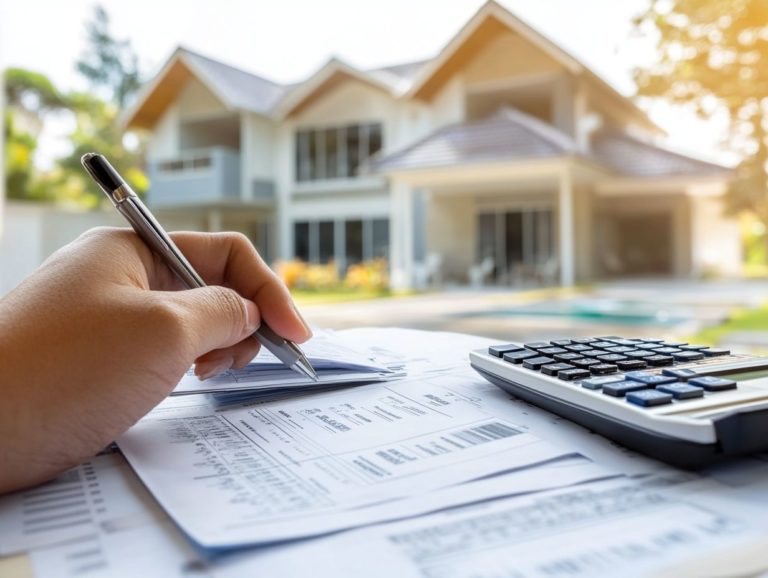What Are the Key Factors in Home Appraisal?
Ready to unlock the secrets behind home appraisals? Understanding this process is vital for anyone considering buying or selling property. This process plays a crucial role in determining a home’s value and has a substantial impact on real estate transactions.
In this article, you will explore what home appraisal entails, the key factors that influence it such as location, size, and recent sales and the essential role of the appraiser.
You ll find valuable tips for preparing for an appraisal and strategies to tackle a low appraisal. Don t wait! Discover how to maximize your home s value before your appraisal.
Contents
- Key Takeaways:
- Understanding Home Appraisal
- Factors that Affect Home Appraisal
- The Role of the Appraiser
- Preparing for a Home Appraisal
- Dealing with a Low Appraisal
- Frequently Asked Questions
- What Are the Key Factors in Home Appraisal?
- How Does the Location Affect a Home Appraisal?
- What Role Does Size Play in a Home Appraisal?
- How Does the Condition of a Home Impact Its Appraisal?
- Do Amenities Affect a Home Appraisal?
- How Do Recent Sales of Similar Homes Impact a Home Appraisal?
- What Is the Role of Current Market Trends in a Home Appraisal?
Key Takeaways:

- The location and neighborhood of a home play a significant role in its appraisal value, as they impact its desirability and market demand.
- The size and condition of a home, along with recent comparable sales, are key factors that appraisers consider when determining its value.
- Homeowners can prepare for a home appraisal by making necessary repairs and providing information on recent renovations, upgrades, and maintenance.
Understanding Home Appraisal
Grasping the nuances of home appraisal is essential for you, whether you re buying or selling in the real estate market.
A home appraisal represents an unbiased professional assessment carried out by certified appraisers to ascertain the market value of a property. This evaluation takes into account several key factors, including the home’s location, its condition, and specific features like the number of bedrooms and bathrooms.
The appraisal value holds significant weight in securing financing from mortgage lenders. This impacts your confidence as a buyer and affects homeowner equity throughout the buying and selling journey.
Definition and Purpose
A home appraisal is a professional evaluation that determines the fair market value of a property, carefully determined based on specific guidelines. This process is vital for everyone involved in real estate transactions, assuring both buyers and sellers that the property’s price stands up to scrutiny.
When conducting a home appraisal, various factors come into play, including the property’s location, size, condition, and recent sales of comparable homes in the vicinity.
For you as a buyer, grasping the appraised value gives you the power to make informed offers. On the other hand, as a seller, this insight allows you to set pricing that s both realistic and competitive.
Financial institutions usually require an appraisal before they approve a mortgage. This step ensures that the loan amount corresponds with the home’s actual worth, thereby minimizing risk for the lender.
Factors that Affect Home Appraisal
Several key factors play a crucial role in the home appraisal process, significantly affecting both the appraisal value and the overall property assessment.
Location stands out as the most vital element; homes situated in desirable neighborhoods generally fetch higher prices.
As an appraiser evaluates your property, they consider a multitude of influential aspects such as structural updates, recent renovations, and the home’s overall condition. They also analyze current real estate market trends and comparable sales in your area to determine an accurate appraised value.
Location and Neighborhood
The location of your home is among the most critical factors influencing its appraisal value, with neighborhoods playing a pivotal role in determining property assessments.
Neighborhoods can dramatically affect home values. For instance, homes in areas with low crime rates often appraise much higher because buyers feel safer there.
The quality of nearby school systems is another essential factor; homes positioned close to well-rated schools naturally attract families, which further elevates property values.
Local market dynamics, including supply and demand as well as recent sales in the area, also play a significant role in the appraisal process. Each of these elements weaves together to paint a comprehensive picture of your property’s worth.
Home Size and Condition

The size and condition of a home are important factors in the appraisal process. They directly impact its overall value and appraisal outcome.
Consider the dimensions of the property, such as the number of bedrooms and bathrooms. These aspects play a significant role in shaping its market appeal and financial worth.
Larger homes often accommodate more family members, making them attractive to buyers seeking space and comfort. Square footage isn t just about size; it also relates to functionality and layout, which can either elevate or diminish a property’s desirability.
The condition of a home profoundly affects its appraisal. Structural updates like new roofing, modern plumbing, or energy-efficient windows can significantly boost a home s value. Conversely, issues such as pest damage or outdated electrical systems can lead to depreciation, prompting potential buyers to present lower offers.
Both size and condition are essential components in assessing a home s worth in today’s market.
Recent Comparable Sales
Recent comparable sales play a crucial role in the appraisal process. They enable you to assess current market conditions and property values effectively.
By analyzing these sales, you can uncover pricing trends and determine a property’s worth in relation to similar properties recently sold in your area. Factors such as location, size, and overall condition significantly influence the appraisal outcome.
Homes within the same neighborhood provide a more accurate comparison due to shared economic factors and local amenities. You should carefully consider features like the number of bedrooms, upgrades, and lot size to establish a fair market value that reflects current demand and supply dynamics.
The Role of the Appraiser
The appraiser’s role is crucial in the home appraisal process. They determine the accurate appraisal value of a property, considering various influential factors that impact the final assessment.
Qualifications and Responsibilities
To perform accurate property assessments and provide reliable appraisal values, you need specific qualifications and certifications. This journey often starts with a solid educational foundation, typically requiring a bachelor’s degree in finance, real estate, or a related field.
After your academic pursuits, engage in state-mandated training that includes hands-on experience under a licensed appraiser.
Obtaining certifications from reputable organizations, like the Appraisal Institute or the American Society of Appraisers, enhances your credibility and expertise.
As an appraiser, you ll inspect properties, analyze market trends, evaluate comparable sales, and prepare detailed reports that accurately reflect a property s fair market value. All this must be done while adhering to strict ethical standards and regulations, ensuring your assessments are trustworthy and professional.
Preparing for a Home Appraisal
Getting ready for a home appraisal can make a big difference! It s crucial for homeowners who want to secure a favorable appraisal value that reflects their property’s worth.
Steps to Take Before the Appraisal

Act now! Here are key steps to boost your appraisal value:
One effective approach is to undertake home improvements, such as applying fresh paint, updating fixtures, or making minor renovations to enhance curb appeal. Focus on enhancing storage space by decluttering and organizing areas, making rooms appear larger and more inviting.
Ensure your garage is tidy and free of excess items to positively influence the appraiser s perspective.
Ensure that all systems in your home are in good working order by addressing repairs or maintenance issues that could detract from its overall value. By implementing these strategies, you create a more favorable impression, ultimately leading to a more accurate appraisal.
Dealing with a Low Appraisal
A low appraisal can be challenging for homeowners. It often leads to financial shortfalls during property sales or purchases.
Understanding these implications is vital for making informed decisions.
Options and Strategies for Homeowners
Facing a low appraisal? You have several options and strategies to tackle the situation effectively.
One approach is to appeal the appraisal decision. Gather additional evidence that could support a higher valuation, like recent comparable sales or improvements you’ve made to your property.
Consider specific home enhancements. Upgrading kitchen appliances or boosting your curb appeal could make a notable difference in future appraisals.
Revising your asking price to align with current market conditions is also practical. This allows you to adopt a more flexible strategy that attracts potential buyers while softening the appraisal’s impact.
By exploring these avenues, you can navigate the complexities of the real estate market with increased confidence.
Frequently Asked Questions
Here are some common questions about home appraisals.
What Are the Key Factors in Home Appraisal?
The key factors in home appraisal include location, size, condition, amenities, recent sales of similar homes, and current market trends.
How Does the Location Affect a Home Appraisal?

The location of a home is crucial for its appraisal. Homes in desirable areas, like those with good school districts or close to amenities, tend to have higher appraised values.
What Role Does Size Play in a Home Appraisal?
The size of a home, including the number of bedrooms and bathrooms, is an important factor in its appraisal. Generally, larger homes have higher appraised values.
How Does the Condition of a Home Impact Its Appraisal?
The condition of a home is key to its appraisal. Homes in good condition, with updated features and well-maintained exteriors, generally have higher appraised values than those in poor condition.
Do Amenities Affect a Home Appraisal?
Yes, amenities such as a pool, fireplace, or updated kitchen can impact a home’s appraised value. These features often add value to the home.
How Do Recent Sales of Similar Homes Impact a Home Appraisal?
Recent sales of similar homes in the area, also known as comparables or comps, are used by appraisers to determine a home’s value. These sales help establish a baseline for the appraised value of the home being evaluated.
What Is the Role of Current Market Trends in a Home Appraisal?
Current market trends, such as supply and demand, interest rates, and economic conditions, can also impact a home’s appraisal. These factors affect the perceived value of a home and ultimately influence its appraised value.






